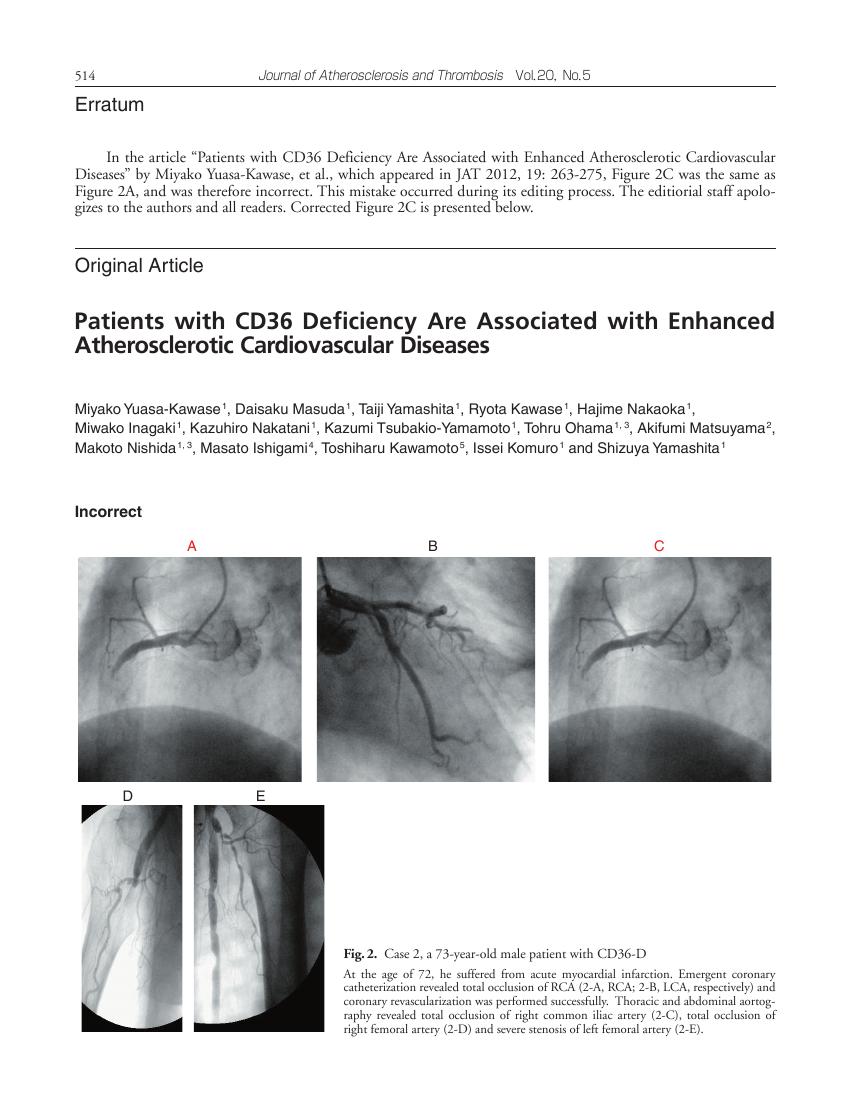4 0 0 0 OA Patients with CD36 Deficiency Are Associated with Enhanced Atherosclerotic Cardiovascular Diseases
- 著者
- Miyako Yuasa-Kawase Daisaku Masuda Taiji Yamashita Ryota Kawase Hajime Nakaoka Miwako Inagaki Kazuhiro Nakatani Kazumi Tsubakio-Yamamoto Tohru Ohama Akifumi Matsuyama Makoto Nishida Masato Ishigami Toshiharu Kawamoto Issei Komuro Shizuya Yamashita
- 出版者
- 一般社団法人 日本動脈硬化学会
- 雑誌
- Journal of Atherosclerosis and Thrombosis (ISSN:13403478)
- 巻号頁・発行日
- vol.19, no.3, pp.263-275, 2012 (Released:2012-03-26)
- 参考文献数
- 48
- 被引用文献数
- 9 32
Aim: The clustering of dyslipidemia, impaired glucose tolerance and hypertension increases the morbidity and mortality from cardiovascular events. A class B scavenger receptor, CD36, is a receptor for oxidized LDL and a transporter of long-chain fatty acids. Because of the impaired uptake of oxidized LDL in CD36-deficient macrophages and from the results of CD36 knockout mice, CD36 deficiency (CD36-D) was supposed to be associated with reduced risks for coronary artery disease (CAD); however, CD36-D patients are often accompanied by a clustering of coronary risk factors. The current study aimed to investigate the morbidity and severity of cardiovascular diseases in CD36-D patients.Methods: By screening for CD36 antigen on platelets and monocytes using FACS or the absent myocardial accumulation of 123I-BMIPP by scintigraphy, 40 patients with type I CD36-D were collected, the morbidity of CAD and their features of atherosclerotic cardiovascular diseases were observed. Screening for CD36-D in both CAD patients (n =319) and healthy subjects (n =1,239) were underwent.Results: The morbidity of CAD was significantly higher in CD36-D patients than in the general population; 50% of patients (20 out of 40) had CAD identified by BMIPP scintigraphy and 37.5% (3 out of 8) by FACS screening, respectively. Three representative CD36-D cases demonstrated severe CAD and atherosclerosis. The frequency of CD36-D was three times higher in CAD patients than in healthy subjects (0.9% vs 0.3%, p <0.0001).Conclusion: The morbidity of CAD is significantly higher in CD36-D patients suffering from severe atherosclerosis, implying that the status of CD36-D might be atherogenic.
2 0 0 0 OA Patients with CD36 Deficiency Are Associated with Enhanced Atherosclerotic Cardiovascular Diseases
- 著者
- Miyako Yuasa-Kawase Daisaku Masuda Taiji Yamashita Ryota Kawase Hajime Nakaoka Miwako Inagaki Kazuhiro Nakatani Kazumi Tsubakio-Yamamoto Tohru Ohama Akifumi Matsuyama Makoto Nishida Masato Ishigami Toshiharu Kawamoto Issei Komuro Shizuya Yamashita
- 出版者
- 一般社団法人 日本動脈硬化学会
- 雑誌
- Journal of Atherosclerosis and Thrombosis (ISSN:13403478)
- 巻号頁・発行日
- vol.20, no.5, pp.514-515, 2013 (Released:2013-05-29)
- 参考文献数
- 48
